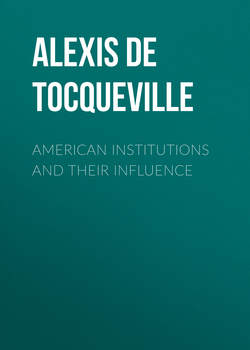Читать книгу American Institutions and Their Influence - Alexis de Tocqueville - Страница 34
AMERICAN INSTITUTIONS
CHAPTER VIII
THE EXECUTIVE POWER. 134
ОглавлениеDependence of the President—He is Elective and Responsible.—He is Free to act in his own Sphere under the Inspection, but not under the Direction, of the Senate.—His Salary fixed at his Entry into Office.—Suspensive Veto.
The American legislators undertook a difficult task in attempting to create an executive power dependent on the majority of the people and nevertheless sufficiently strong to act without restraint in its own sphere. It was indispensable to the maintenance of the republican form of government that the representatives of the executive power should be subject to the will of the nation.
The president is an elective magistrate. His honor, his property, his liberty, and his life, are the securities which the people has for the temperate use of his power. But in the exercise of his authority he cannot be said to be perfectly independent; the senate takes cognizance of his relations with foreign powers, and of the distribution of public appointments, so that he can neither be bribed, nor can he employ the means of corruption. The legislators of the Union acknowledged that the executive power would be incompetent to fulfill its task with dignity and utility, unless it enjoyed a greater degree of stability and of strength than had been granted to it in the separate states.
The president is chosen for four years, and he may be re-elected; so that the chances of a prolonged administration may inspire him with hopeful undertakings for the public good, and with the means of carrying them into execution. The president was made the sole representative of the executive power of the Union; and care was taken not to render his decisions subordinate to the vote of a council—a dangerous measure, which tends at the same time to clog the action of the government and to diminish its responsibility. The senate has the right of annulling certain acts of the president; but it cannot compel him to take any steps, nor does it participate in the exercise of the executive power.
The action of the legislature on the executive power may be direct; and we have just shown that the Americans carefully obviated this influence; but it may, on the other hand, be indirect. Public assemblies which have the power of depriving an officer of state of his salary, encroach upon his independence; and as they are free to make the laws, it is to be feared lest they should gradually appropriate to themselves a portion of that authority which the constitution had vested in his hands. This dependence of the executive power is one of the defects inherent in republican constitutions. The Americans have not been able to counteract the tendency which legislative assemblies have to get possession of the government, but they have rendered this propensity less irresistible. The salary of the president is fixed, at the time of his entering upon office, for the whole period of his magistracy. The president is, moreover, provided with a suspensive veto, which allows him to oppose the passing of such laws as might destroy the portion of independence which the constitution awards him. The struggle between the president and the legislature must always be an unequal one, since the latter is certain of bearing down all resistance by persevering in its plans; but the suspensive veto forces it at least to reconsider the matter, and, if the motion be persisted in, it must then be backed by a majority of two-thirds of the whole house. The veto is, in fact, a sort of appeal to the people. The executive power, which, without this security, might have been secretly oppressed, adopts this means of pleading its cause and stating its motives. But if the legislature is certain of overpowering all resistance by persevering in its plans, I reply, that in the constitutions of all nations, of whatever kind they may be, a certain point exists at which the legislator is obliged to have recourse to the good sense and the virtue of his fellow-citizens. This point is more prominent and more discoverable in republics, while it is more remote and more carefully concealed in monarchies, but it always exists somewhere. There is no country in the world in which everything can be provided for by the laws, or in which political institutions can prove a substitute for common sense and public morality.
